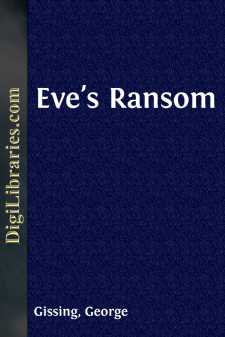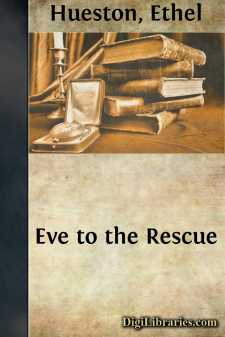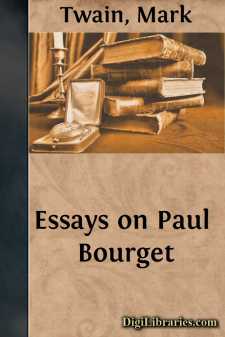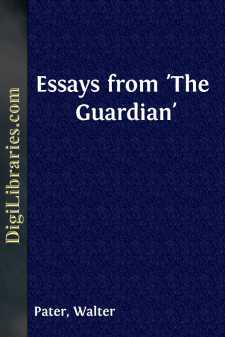Literary Collections
- American 84
- Ancient, Classical & Medieval 14
- Asian 1
- Australian & Oceanian 1
- Canadian 55
- Continental European 121
- English, Irish, Scottish, Welsh 179
- Essays 160
- General 24
- Letters 46
- Middle Eastern 1
Literary Collections Books
Sort by:
by:
George Gissing
CHAPTER I On the station platform at Dudley Port, in the dusk of a February afternoon, half-a-dozen people waited for the train to Birmingham. A south-west wind had loaded the air with moisture, which dripped at moments, thinly and sluggishly, from a featureless sky. The lamps, just lighted, cast upon wet wood and metal a pale yellow shimmer; voices sounded with peculiar clearness; so did the rumble of...
more...
by:
Ethel Hueston
IN DEFIANCE OF DUTY “To-morrow being Saturday afternoon,” began Eveley, deftly slipping a dish of sweet pickles beyond the reach of the covetous fat fingers of little niece Nathalie,—“to-morrow being Saturday afternoon—” “Doesn’t to-morrow start at sunrise as usual?” queried her brother-in-law curiously. “As every laborer knows,” said Eveley firmly, “Saturday begins with the...
more...
by:
Honore de Balzac
EVE AND DAVID Lucien had gone to Paris; and David Sechard, with the courage and intelligence of the ox which painters give the Evangelist for accompanying symbol, set himself to make the large fortune for which he had wished that evening down by the Charente, when he sat with Eve by the weir, and she gave him her hand and her heart. He wanted to make the money quickly, and less for himself than for...
more...
by:
George Meredith
CHAPTER I. ABOVE BUTTONS Long after the hours when tradesmen are in the habit of commencing business, the shutters of a certain shop in the town of Lymport-on-the-Sea remained significantly closed, and it became known that death had taken Mr. Melchisedec Harrington, and struck one off the list of living tailors. The demise of a respectable member of this class does not ordinarily create a profound...
more...
by:
Honore de Balzac
I There are houses in certain provincial towns whose aspect inspires melancholy, akin to that called forth by sombre cloisters, dreary moorlands, or the desolation of ruins. Within these houses there is, perhaps, the silence of the cloister, the barrenness of moors, the skeleton of ruins; life and movement are so stagnant there that a stranger might think them uninhabited, were it not that he...
more...
by:
Hannah More
INTRODUCTION. It is with the utmoÃ
¿t diffidence that the following pages are Ã
¿ubmitted to the inÃ
¿pection of the Public: yet, however the limited abilities of the author may have prevented her from Ã
¿ucceeding to her wiÃ
¿h in the execution of her preÃ
¿ent attempt, Ã
¿he humbly truÃ
¿ts that the uprightneÃ
¿s of her intention will procure it a candid...
more...
by:
Mark Twain
WHAT PAUL BOURGET THINKS OF US He reports the American joke correctly. In Boston they ask, How much does he know? in New York, How much is he worth? in Philadelphia, Who were his parents? And when an alien observer turns his telescope upon us—advertisedly in our own special interest—a natural apprehension moves us to ask, What is the diameter of his reflector? I take a great interest in M....
more...
INTRODUCTION THE KINDS OF CRITICISM It is probably unnecessary, and might possibly be impertinent, to renew here at any length the old debate between reviewers as reviewers, and reviewers as authors—the debate whether the reissue of work contributed to periodicals is desirable or not. The plea that half the best prose literature of this century would be inaccessible if the practice had been...
more...
by:
Walter Pater
[3] THE making of an anthology of English prose is what must have occurred to many of its students, by way of pleasure to themselves, or of profit to other persons. Such an anthology, the compass and variety of our prose literature being considered, might well follow exclusively some special line of interest in it; exhibiting, for instance, what is so obviously striking, its imaginative power, or its...
more...
LIFE OF EMERSON Ralph Waldo Emerson was born in Boston, May 25, 1803. He was descended from a long line of New England ministers, men of refinement and education. As a school-boy he was quiet and retiring, reading a great deal, but not paying much attention to his lessons. He entered Harvard at the early age of fourteen, but never attained a high rank there, although he took a prize for an essay on...
more...











